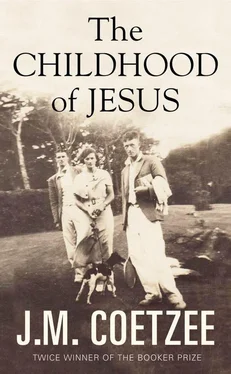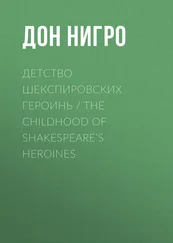‘That’s all. It’s English. Can I learn English? I don’t want to speak Spanish any more. I hate Spanish.’
‘You speak very good Spanish. You sing beautifully too. Maybe you will be a singer when you grow up.’
‘No. I’m going to be a magician in a circus. What does it mean, Wer reitet so ?’
‘I don’t know. I don’t speak English.’
‘Can I go to school?’
‘You will have to wait a while for that, until your next birthday. Then you can go to school along with Fidel.’
They get off at the stop marked Terminal , where the bus turns back. The map he has picked up at the bus station shows tracks and footpaths up into the hills; his plan is to follow a winding path that leads to a lake, which on the map has a starburst next to it, signifying that it is a beauty spot.
They are the last passengers to get off, and the sole walkers on the footpath. The countryside through which they pass is empty. Though the land seems lush and fertile, there is no sign of human habitation.
‘Isn’t it peaceful here in the country!’ he remarks to the boy, though in truth the emptiness strikes him as desolate rather than peaceful. It would be better if there were animals he could point out, cattle or sheep or pigs, going about their animal business. Even rabbits would do.
Now and again they see birds in flight, but too far away and too high in the sky for him to be sure what kind they are.
‘I’m tired,’ announces the boy.
He inspects the map. They are halfway to the lake, he guesses. ‘I will carry you for a while,’ he says, ‘until your strength comes back.’ He swings the boy onto his shoulders. ‘Sing out as soon as you see a lake. That will be where the water comes from that we drink. Sing out if you see it. In fact, sing out if you see any water. Or if you see any country folk.’
They press on. But either he has misread the map or the map itself is at fault, for after rising sharply and then plunging as steeply, the track terminates without warning at a brick wall and a rusty gate overgrown with ivy. Beside the gate is a weather-beaten painted sign. He pushes aside the ivy. ‘ La Residencia ,’ he reads.
‘What is a residencia ?’ asks the boy.
‘A residencia is a house, a grand one. But this particular residencia may be nothing but a ruin.’
‘Can we look?’
They try the gate, but it will not budge. Just as they are about to turn back, there comes, carried on the breeze, the faint sound of laughter. Following the sound, beating their way through heavy undergrowth, they come to a point where the brick wall gives way to a high wire-netting fence. On the other side of the fence is a tennis court, and on the court are three players, two men and a woman, dressed in white, the men in shirts and long trousers, the woman in a full skirt and a blouse with the collar turned up, and a cap with a green visor.
The men are tall, broad-shouldered, slim-hipped; they look like brothers, perhaps even twin brothers. The woman has teamed up with one of them to play against the other. They are all practised players, he sees that at once, dextrous and swift of foot. The sole man is particularly good, holding his own with ease.
‘What are they doing?’ whispers the boy.
‘It’s a game,’ he replies in a low voice. ‘It is called tennis. You try to hit the ball past your opponent. Like scoring a goal in football.’
The ball thuds into the fence. Turning to retrieve it, the woman sees them. ‘Hello,’ she says, and gives the boy a smile.
Something stirs inside him. Who is this woman? Her smile, her voice, her bearing — there is something obscurely familiar about her.
‘Good morning,’ he says, his throat dry.
‘Come, hurry up!’ her partner calls. ‘Game point!’
No further words pass. In fact, when her partner comes a minute later to fetch a ball, he gives the pair of them a glowering look, as if to make it clear they are not welcome, not even to watch.
‘I’m thirsty,’ whispers the boy.
He offers the flask of water he has brought.
‘Haven’t we got anything else?’
‘What do you want — nectar?’ he hisses back, then at once regrets his irritation. From his pack he takes an orange and tears a hole in the peel. The boy sucks greedily.
‘Is that better?’ he asks.
The boy nods. ‘Are we going to the Residencia?’
‘This must be the Residencia. The tennis court must be part of it.’
‘Can we go in?’
‘We can try.’
Leaving the tennis players behind, they plunge on through the undergrowth, following the wall, until they emerge onto a dirt road leading to a pair of high iron gates. Behind the bars, through trees, they can glimpse an imposing building in dark stone.
Though closed, the gates are not locked. They slip through and walk up a driveway ankle-deep in fallen leaves. A sign with an arrow points to an arched entranceway that opens into a courtyard at whose centre stands a marble statue, a larger-than-life figure of a woman or perhaps an angel in flowing robes gazing at the horizon, holding up a flaming torch.
‘Good afternoon, sir,’ says a voice. ‘Can I help you?’
The speaker is an elderly man, his face lined, his back bent. He wears a faded black uniform; he has emerged from a little office or lodge in the entranceway.
‘Yes. We have just come from the city. I wonder if we may have a word with one of the residents, a lady who is playing tennis on the court at the back.’
‘And would the lady in question wish to speak to you, sir?’
‘I believe so. There is a matter of importance that I need to discuss with her. A family matter. But we can wait until their game is over.’
‘And the lady’s name?’
‘That I can’t tell you, because I don’t know it. But I can describe her. I would say she is about thirty years old, of medium height, with dark hair which she wears swept away from her face. She is in the company of two young men. And she is dressed all in white.’
‘There are a number of ladies of that general appearance in La Residencia, sir, several of whom play tennis. Tennis is quite a popular recreation.’
The boy tugs at his sleeve. ‘Tell him about the dog,’ he whispers.
‘The dog?’
The boy nods. ‘The dog they had with them.’
‘My young friend says they have a dog,’ he repeats. He himself cannot recollect any dog.
‘Aha!’ says the porter. He retreats into his lair, pulling the glass door to behind him. In the dim light they can make him out shuffling through papers. Then he picks up a telephone, dials a number, listens, lays down the receiver, and returns. ‘I’m sorry, sir, there is no reply.’
‘That is because she is out on the tennis court. Can’t we just go to the courts?’
‘I’m sorry, but that is not allowed. Our facilities are off limits to visitors.’
‘Then may we wait here until she has finished playing?’
‘You may.’
‘May we walk in the garden while we wait?’
‘You may.’
They wander off into the overgrown garden.
‘Who is the lady?’ asks the boy.
‘Didn’t you recognize her?’
The boy shakes his head.
‘Didn’t you feel a strange movement in your breast when she spoke to us, when she said hello — a kind of tug at the heartstrings, as if you might have seen her before, in some other place?’
Doubtfully the boy shakes his head.
‘I ask because the lady may be the very person we are looking for. That, at least, is the feeling I have.’
‘Is she going to be my mother?’
‘I don’t know for sure. We will have to ask her.’
They complete a circuit of the garden. Back at the porter’s lodge, he taps at the glass. ‘Would you mind ringing the lady again?’ he asks.
Читать дальше












